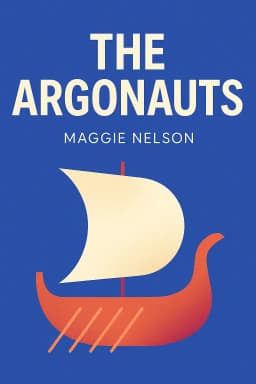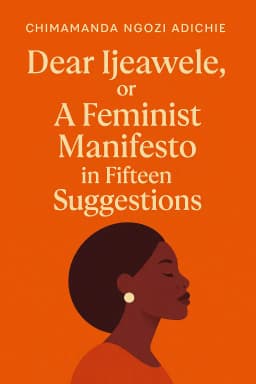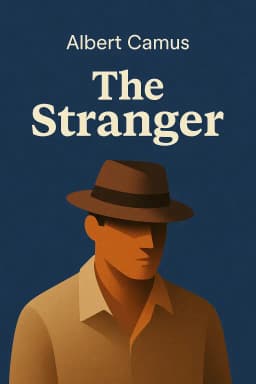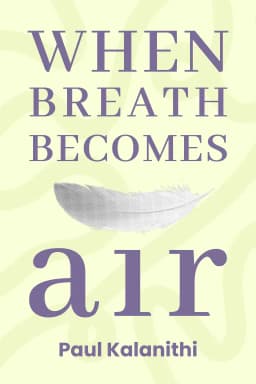
Love Is a Verb, Not a Noun
Golden Hook & Introduction
SECTION
Michael: Okay, Kevin. The Argonauts by Maggie Nelson. Review it in exactly five words. Kevin: My brain hurts. In a good way. Michael: Perfect. Mine is: Love is a verb, not a noun. Kevin: Oh, I like that. That's a much more poetic way of putting it. Mine just sounds like I need an aspirin. But it’s true, this book is dense. It’s beautiful, but it makes you work for it. Michael: It absolutely does. And that’s the perfect way to describe The Argonauts by Maggie Nelson. It's this incredible, genre-defying book that won the National Book Critics Circle Award for Criticism. Nelson herself, who is a MacArthur 'genius' grant recipient, calls it "autotheory." Kevin: Autotheory. So it's a memoir with a PhD. Michael: Exactly. She's weaving her own life story into some pretty heavy philosophical inquiry. And the life story at its heart is profound: she writes about her relationship with her partner, the artist Harry Dodge, as he is transitioning, while she is pregnant with their son. Kevin: Wow. Okay, so both of them are undergoing these massive, fundamental physical and identity transformations at the same time. Michael: At the exact same time. And that parallel journey is the perfect embodiment of the book's central idea, which is all right there in the title: The Argonauts.
The Ship of Theseus in Love: Identity as a Constant State of Becoming
SECTION
Kevin: Right, the Argonauts. I remember them from Greek mythology, Jason and the Golden Fleece. But what’s the connection here? Michael: It comes from a thought experiment by the philosopher Roland Barthes, who Nelson quotes. The Argonauts’ ship, the Argo, is on a long journey. Along the way, its planks rot, and they get replaced one by one. By the end, not a single original plank remains. The question is: is it still the same ship? Kevin: The classic Ship of Theseus paradox. Michael: Precisely. And Nelson applies this directly to love and identity. She and Harry are the ship. Their bodies are the planks, constantly changing. She's growing a new life inside her; he's using testosterone and having surgery to create a body that aligns with his identity. The world sees two people in flux and asks, "What are you now? Are you still the same?" Kevin: That is such a powerful metaphor. Because it’s not just about gender transition or pregnancy. We all change over time. Our cells replace themselves, our beliefs shift, our personalities evolve. So what holds a relationship together when the people in it are fundamentally changing? Michael: And Nelson gives us this incredibly vivid, almost surreal story to illustrate it. In 2011, she's four months pregnant, and Harry is six months on testosterone. They fly to Fort Lauderdale for his top surgery. Kevin: That sounds like an intensely stressful vacation. Michael: It’s not exactly a beach holiday. They're staying in a generic Sheraton during monsoon season. Harry is recovering from major surgery, in pain, with drains coming out of his chest that Nelson has to empty. Meanwhile, she’s dealing with her own bodily strangeness—the early stages of pregnancy. They're cooped up in this hotel room, two bodies in radical transformation, navigating this incredibly intimate, clinical, and loving process together. Kevin: Wow. The image of them in that sterile hotel room, with a storm raging outside, while their bodies are just completely remaking themselves… that’s potent. So, in the metaphor, the 'ship' is their relationship, and the 'planks' are their bodies, their identities. But what's the 'Argo'? What's the thing that stays the same? Michael: That’s the beautiful, radical core of the book. For Nelson, the 'Argo' isn't a fixed thing. It's not a soul or an unchanging essence. The identity of the ship, the thing that persists, is the ongoing act of staying together, the continuous journey of loving and relating to each other through the changes. It’s the shared name, the shared history, the commitment to keep rebuilding. Kevin: So love isn't a state of being, it's a process of becoming. It's not something you are, it's something you do. Michael: That's it exactly. Love is the verb, not the noun. It’s the labor of replacing the planks together.
Queer Family-Making and the 'Many-Gendered Mothers of the Heart'
SECTION
Michael: And this idea of building a new kind of ship, a new entity, extends beyond the couple into how they build their family. This is where Nelson gets really radical and, for some readers, quite challenging. Kevin: How so? It seems like a pretty loving foundation for a family. Michael: It is, but she argues that creating a queer family isn't just a private act. It's a political one that pushes back against what some theorists call "reproductive futurism." Kevin: That sounds like a sci-fi movie title. What does it mean? Michael: It’s the pervasive, often unspoken idea that the ultimate goal of society is to secure a future for "The Child." It's the logic that says we must do everything—from going to war to gutting social programs—for the sake of the children. The Child becomes this abstract, sentimentalized symbol that justifies all sorts of political moves. Kevin: And queerness has historically been positioned outside of that, right? As the sterile, non-reproductive, "fun" alternative. Michael: Exactly. And Nelson has this perfect, frustrating story about it. She, Harry, and their five-month-old son, Iggy, go to a trapeze-burlesque show in L.A. to see a friend perform. Kevin: Okay, I'm already seeing the potential for conflict here. Michael: They get to the door, and the bouncer stops them. He says it's an 18+ show. Nelson says, "We're not worried about him seeing anything, he's a baby, he'll probably sleep through it." But the bouncer clarifies. The problem isn't that the show will harm the baby. The problem is that the baby's presence will disrupt the "cabaret atmosphere" for the other patrons. Kevin: Wait, so they were kicked out by their own community, in a sense? Because their baby was killing the vibe? Michael: That's the heart of it. The bouncer basically says other people came here to get away from their kids, to be in an adult, queer space. And Nelson is floored. She connects it to this idea that mainstream culture is only comfortable with queerness as long as it remains, in her words, "unpolluted by procreative femininity." Kevin: I have to admit, I can kind of see the bouncer's point, though. Some spaces are meant to be escapes from domesticity. Is it wrong to want a space that isn't centered around children? Michael: And that's the tension Nelson wants us to sit with! She argues that this thinking creates a false binary. It forces a choice: you can either be radical, transgressive, and queer, or you can be a normative, procreative family. You can't be both. Her life, her family, is proof that you can. This is where she introduces this amazing concept of "sodomitical maternity." Kevin: Whoa, that's a provocative term. It sounds intentionally shocking. What is she trying to get at with that? Michael: It is intentionally shocking. It's a way of reclaiming motherhood from the sanitized, heteronormative ideal. It’s a motherhood that doesn't pretend it isn't sexual, or strange, or perverse. It's a parenthood that can exist at a burlesque show. It’s about refusing to be assimilated into a clean, tidy version of family, and instead insisting on a queer family's right to be messy, complex, and whole.
The Ethics of Articulation
SECTION
Kevin: It's one thing to live this and think it, but it's another to write it all down for the world to see. I mean, she's writing about the most intimate details of her partner's body and their life together. How does she navigate that? Michael: That question is the engine of the entire book. It's what makes it "autotheory." She's constantly turning the lens on herself as a writer and questioning the ethics of her own project. And there's this one devastating, incredibly vulnerable moment she shares. Kevin: What happens? Michael: She shows an early draft of the book—the very book we're reading—to her partner, Harry. And his reaction isn't what she expects. He feels "unbeheld." He feels like he's been turned into a character, an object of her intellectual and artistic gaze, rather than a partner she's in conversation with. Kevin: Oh, that's rough. To have the person you love most read your loving portrait of them and feel… misrepresented. Or maybe just… represented, which is its own kind of violence. Michael: Exactly. She quotes the writer Wayne Koestenbaum, whose partner once told him after reading a rhapsodic piece he wrote about her, "Next time, write to me." Not about me. And that becomes a central crisis for Nelson. How do you write about the people you love without colonizing their experience? Kevin: That's fascinating. The central conflict of the book is... the book itself. It’s performing its own anxieties in real time. Michael: It is. And this pressure doesn't just come from inside the relationship. It comes from the outside world, too. There's another story she tells about the academic Jane Gallop, a feminist theorist. In the late 90s, Gallop gave a presentation that included photos of herself and her young son, analyzing photography from the perspective of a mother. Kevin: Okay, sounds interesting. Michael: The official respondent to her talk was another famous academic, Rosalind Krauss. And Krauss gets up and just destroys her. She praises Gallop's early work and then says it's "deeply disturbing to behold the mediocrity, naïveté, and soft-mindedness" of her new work. She basically accuses Gallop of having her mind "rotted" by maternity. Kevin: You're kidding me. That's brutal. So you're not allowed to be a serious intellectual and a mother who writes about motherhood? Michael: That was the message. So Nelson is navigating this minefield. From inside her relationship, there's the fear of misrepresenting her partner. And from the outside world, there's this historical precedent of women's domestic and maternal experiences being dismissed as unserious, as intellectually "soft." Her entire book is an act of defiance against both.
Synthesis & Takeaways
SECTION
Michael: When you put it all together, you see that these three things are really part of the same project. Remaking the self and the relationship, like the Argo. Remaking the idea of family with concepts like "sodomitical maternity." And remaking language and theory itself by forcing it to hold these messy, personal, lived realities. It’s all a profound argument for fluidity. Kevin: It really is. The takeaway isn't a set of rules or a "how-to" guide. It feels more like a permission slip. Permission to be in-process. Permission to be fluid, to not have all the answers about who you are or who you love or what your family looks like. Permission for your identity to be a verb. Michael: I love that. A permission slip. Because the book doesn't offer easy answers. It offers better questions. It makes you look at your own life and ask, what parts of my own 'ship' am I replacing right now? What parts am I clinging to? And what parts am I afraid to change? Kevin: That’s a question that stays with you long after you finish the book. And it's one we'd love to hear your thoughts on. What parts of this resonated with you? Is love a verb or a noun in your life? Find us on our socials and join the conversation. We're always curious to hear how these ideas land with you. Michael: This is Aibrary, signing off.









